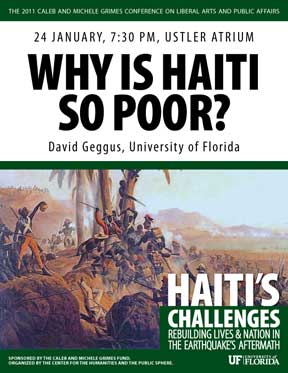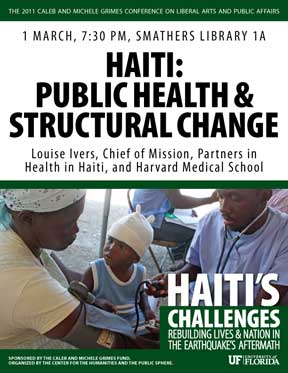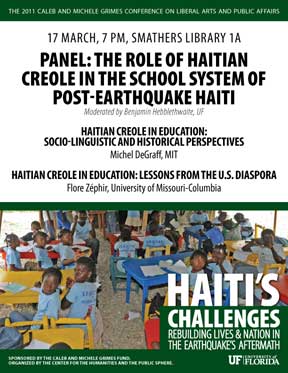Events in this series
View lectures from this series online.
Why Is Haiti So Poor?
24 January 2011, 7:30 pm Ustler Atrium
David Geggus, Department of History, University of Florida
Haiti is the poorest country in the hemisphere but just over two hundred years ago it was the Americas’ leading exporter. In becoming the first American nation to abolish slavery and racial discrimination, and the Caribbean’s first independent state, Haiti paid a high price. Yet how much of its current problems can be traced to its colonial and revolutionary past? How much is attributable to its treatment by the outside world, to its peasantry, or its politicians? This talk offers a historical background to the country’s present crisis.
Professor David Geggus received his Ph.D. in 1979 from York University, England, M.A.s from the Universities of London and Oxford (1972, 1976), and his B.A. from Oxford University in 1971. He joined University of Florida Department of History in 1983 after holding research positions at the Universities of Southampton and Oxford. He has published four books, including Slavery, War and Revolution (Oxford, 1982) and Haitian Revolutionary Studies (Bloomington, 2002), and some eighty academic articles. He teaches courses on Caribbean history and slavery in the Atlantic world. He has been awarded fellowships from the French Government, The British Academy, John Simon Guggenheim Foundation, National Humanities Center, Woodrow Wilson Center for International Scholars, Social Science Research Council, National Endowment for the Humanities, and the John Carter Brown Library.
 The Anthropology of Survival in Post-Earthquake Haiti: Institutional Predators, Individual Maneuver
The Anthropology of Survival in Post-Earthquake Haiti: Institutional Predators, Individual Maneuver
7 February 2011, 7:30 pm Ustler Atrium
Gerald Murray, Department of Anthropology, University of Florida
The direct victims of the Haitian earthquake of January 2010 were those who lost their lives, limbs, and/or homes. But the tragedy also exacerbated the already stressful economic and social conditions in which virtually the entire Haitian population was living before the earthquake. The post-earthquake rallying cry among knowledgeable Haitians was not to “rebuild Haiti” but to “redesign Haiti”. However those same patterns of institutional predation by well-entrenched financial gatekeepers – both Haitian and foreign – are gearing up for business as usual in hand-rubbing expectation of the billions that have been promised by the outside world. Based on his anthropological fieldwork in Haiti both before and after the earthquake, Dr. Murray will discuss the multiple economic and migratory survival strategies that individual Haitian kin groups are activating in total mistrust of their government and in total skepticism of developmental rhetoric about Haiti’s future.
Prof. Emeritus Gerald Murray has done extended fieldwork in Haiti and the Dominican Republic, and has engaged in applied contract assignments in 15 countries for 27 public and private agencies. In Haiti, he designed and directed an agroforestry project that during a 20 year period facilitated trees to over a quarter of a million farm families. He has also worked with Save the Children (since the earthquake), USAID, and other NGOs on project related to Haiti and the Dominican Republic. Recent applied research assignments include child slavery in Haiti and the D.R., potential conflicts surrounding planned dam construction that would flood out farming communities near the Panama Canal, and a month of fieldwork on the Gaza Strip among Hebrew-speaking farmers being shelled by Hamas and Islamic Jihad in the turbulent weeks immediately preceding their planned expulsion and involuntary relocation by the Israeli government. He has written three books, 27 articles and book chapters, and 59 applied anthropological reports. He has studied fifteen languages (some extinct) and have interviewed and/or conversed in eight.
 Haiti: Public Health and Structural Change
Haiti: Public Health and Structural Change
1 March 2011, 7:30 pm, Smathers 1A
Louise Ivers, Director, Chief of Mission, Partners in Health in Haiti, and Assistant Professor, Harvard Medical School
Dr. Ivers will frame her talk in the context of her tenure as Director and Chief of Mission of Partners in Health in Haiti. She will draw attention foremost to the structural issues related to food and water security that affect the health of individuals and the ability of the government and other agencies to provide sound public health interventions. Dr. Ivers will also discuss some of the research by Partners in Health of these issues and programs attempting to address them. These factors also related to Haiti’s ability to care for those injured and displaced in the earthquake of January 2010 and the inhabitants who are currently victims of a large cholera epidemic.
Dr. Louise Ivers is Chief of Mission for Partners In Health (PIH) in Haiti, an international non-profit organization that provides direct health care and social services to poor communities around the world, supported by research and advocacy. She is an Assistant Professor of Medicine at Harvard Medical School and an Associate Physician in the Division of Global Health Equity at Brigham and Women’s Hospital (BWH). She completed her residency in Internal Medicine at Massachusetts General Hospital (MGH) and a fellowship in Infectious Diseases at the combined MGH/BWH program. Dr. Ivers also received a diploma in Tropical Medicine and Hygiene from the London School of Hygiene & Tropical Medicine and a Master of Public Health from the Harvard School of Public Health.
Dr. Ivers implements health programs, and is interested in improving the delivery of healthcare in resource poor settings, the provision of care to the rural and urban poor, as well as patient-oriented investigation that offers solutions to barriers to healthcare. She balances her time between management of PIH Haiti, direct clinical service and operational research. Dr. Ivers has contributed to published articles on HIV/AIDS, food insecurity, and prevention of mother-to-child transmission of HIV. Current projects include investigating the impact of targeted food assistance on people with HIV infection in rural Haiti, the effectiveness of ARV therapies on viral suppression in community-based programs, and humanitarian assistance in response to the January 2010 earthquake. Dr. Ivers has served as a Technical Advisor to the WHO and also mentors Haitian and American physicians.
 Two-Part Panel Discussion: The Role of Haitian Creole in the School System of Post-Earthquake Haiti
Two-Part Panel Discussion: The Role of Haitian Creole in the School System of Post-Earthquake Haiti
17 March 2011, 7:00-9:00 pm, Smathers 1A
The panel will be moderated by Prof. Benjamin Hebblethwaite (University of Florida).
The importance of the mother tongue in education is well documented. In the case of Haiti, many of the failures of the school system have been attributed to the fact that instruction is, for the most part, still conducted in French, a language that is mastered at best by 10% of the population. Therefore, the vast majority of Haitian students are excluded from a meaningful education. In the post-earthquake efforts to rebuild Haiti, the school system must be reformed, and instruction in Haitian Creole must be at the forefront of those reforms. In this panel, Professor Michel DeGraff (MIT) and Professor Flore Zéphir (University of Missouri-Columbia) will examine the role of Haitian Creole in education from distinct perspectives: socio-linguistic and historical perspectives, then a perspective based on lessons from the Haitian Diaspora in the United States.
“Haitian Creole in Education: Socio-linguistic and historical perspectives”
Michel DeGraff, Department of Linguistics and Philosophy, MIT
What lessons can be drawn from Haiti’s history and its socio-linguistic profile and from the intellectual history of “Creole” studies in order to mend the country’s socio-economic and political failures? Our answer will take us to colonial and neo-colonial race- and class-based cleavages in Saint-Domingue/Haiti and to the early history of Creole Studies as part of Europe’s imperialist “mission civilisatrice” in Africa and the Americas. As it turns out, both the politics of Creole studies and the socio-linguistics of Haitian Creole—especially the (mis)use of French vs. Haitian Creole in education—are implicated in some of the socio-economic and political agendas that governments, funding agencies and NGOs are now trying to implement in the reconstruction of post-earthquake Haiti. Our thesis is that these political and socio-economic struggles—many of them with language- and education-related reflexes—must be carefully monitored as we Haitians and our allies try to (re)construct a Haiti that will be better for all, and not only for the tiny majority that has traditionally benefited the most from Haiti’s resources.
Michel DeGraff, Associate Professor of Linguistics, M.I.T., is the author of Language Creation and Language Change: Creolization, Diachrony, and Development, and is now finalizing a monograph on Postcolonial Linguistics: The Politics of Creole Studies. His research mostly concerns the development and structures of Creole languages, with focus on his native Haitian Creole. Degraff is also interested in the joint study of linguistic creolization, language change and language acquisition. Another interest relates to the politics of Creole studies, for example, the ways in which linguists’ and other scholars’ theories about, and uses of, Creole languages often reveal less about Creole languages per se than about issues of power, ideology, and geo-politics in the (post-)colonial history of the “New World.” DeGraff argues against what he calls “creole exceptionalism,” the idea that creoles are fundamentally similar to each other and different from other languages. He says the idea has roots that stretch back for centuries, to Western linguists who believed that non-Europeans’ low intelligence hindered their languages.
“Haitian Creole in Education: Lessons from the U.S. Diaspora”
Panelist: Flore Zéphir, Department of Romance Languages and Literatures, University of Missouri-Columbia
What are the best methods for using Haitian Creole as the language of instruction in schools in Haiti? What are the challenges and opportunities associated with such use of Haitian Creole? This presentation focuses on the many efforts that have been undertaken by Haitian educators in the Diaspora here in the United States to educate Haitian immigrant children in their mother tongue. It focuses on the many challenges they have had to overcome with regard to the perception of Haitian Creole as a “low” language and with regard to material development. These challenges must be addressed so Haitian students can have access to a meaningful education that enables them to succeed. Our thesis is that lessons learned from the Diaspora can empower teachers in Haiti to reach and educate all their students and equip them with the skills and knowledge necessary to become productive citizens.
Professor Zéphir, a native of Haiti, is professor of French, coordinator of the Master’s program in foreign language teaching, and chair of the Department of Romance Languages and Literatures at the University of Missouri-Columbia (MU) She is the author of three books: Haitian Immigrants in Black America: A Sociological and Sociolinguistic Portrait (1996), Trends in Ethnic Identification Among Second-Generation Haitian Immigrants in New York City (2001), and The Haitian Americans (2004). She also serves as book review editor for the Journal of Haitian Studies and has received several awards at MU including a Kemper award for excellence in teaching (1995), an award for excellence in advising (2003), and a Faculty-Alumni award (2004). Professor Zéphir teaches French language classes at all levels, as well as courses in foreign language teaching methodologies, French linguistics, bilingualism and multiculturalism, and minority and Creole languages. Her research interests include foreign language education, bilingual education, Creole studies, sociolinguistics, and ethnic and immigrant studies with a particular focus on the Haitian diaspora in the United States.